Retro Replay Review
Gameplay
Conflict places you directly in the hot seat of Middle Eastern politics, charging you with the intense responsibility of guiding Israel through a period of unprecedented volatility. From the moment you assume the premiership following the untimely death of your predecessor, every decision feels weighty and consequential. Whether you focus on shoring up domestic support or forging alliances abroad, the core gameplay loop revolves around weighing political costs against potential benefits.
(HEY YOU!! We hope you enjoy! We try not to run ads. So basically, this is a very expensive hobby running this site. Please consider joining us for updates, forums, and more. Network w/ us to make some cash or friends while retro gaming, and you can win some free retro games for posting. Okay, carry on 👍)
The strategic layer is impressively multifaceted. You’ll need to manage intelligence operations, fund research into advanced weaponry, and balance your defense budget while racing against neighboring powers in the emerging nuclear arms competition. Each policy choice—from secretive surveillance missions to overt arms deals—alters the dynamic balance of power and can trigger chain reactions among rival states and Palestinian factions.
Interspersed with high-level diplomacy are direct military engagements that test your tactical acumen. When negotiations falter, you can order airstrikes or deploy ground forces, and these battles are resolved through manageable but satisfying combat sequences. The ebb and flow between negotiation tables and war rooms keeps tension high and ensures that no two playthroughs feel quite the same.
Graphics
For a title released in 1997, Conflict’s visual presentation remains surprisingly clear and serviceable. The game’s map interface offers an overhead strategic view of the region, with each country delineated by crisp borders and simple color-coding. This clear visual hierarchy is crucial when you’re juggling multiple fronts and need to react swiftly to skirmishes or uprisings.
Character portraits of world leaders and advisors—though somewhat pixelated by modern standards—nevertheless imbue the proceedings with personality. These static images accompany dialogues and briefing screens, lending a human face to cold strategic choices. Menu layouts are straightforward, minimizing frustration as you navigate through intelligence reports, arms purchase menus, and diplomatic communiqués.
When conflicts erupt, the game switches to a more detailed tactical display. Infantry units, armored columns, and air squadrons are represented by iconographic sprites that move across grid-based battlefields. While animations are modest, they efficiently communicate the flow of combat, casualties, and territorial gains, ensuring that players stay immersed in the strategic ramifications rather than being distracted by flashy visuals.
Story
Conflict’s premise—set in 1997 after the assassination (or bomb blast) that topples Israel’s government—is both a thought-provoking and unsettling “what-if” scenario. This narrative hook instantly draws you into a world where every policy shift could lead to peace accords or spiral into regional war. The game’s branching events, influenced by your diplomatic posture and military posture, create a sense of reactive history in the making.
Throughout your tenure, you receive reports of crises that require delicate navigation: ceasefire negotiations, covert operations against hostile regimes, and the ever-present threat of nuclear escalation. Advisors and foreign ministers chime in with recommendations that often conflict, forcing you to balance moral imperatives with national security concerns. The scripted events, while limited by today’s standards, still offer enough variation to keep the political drama compelling.
Although the game doesn’t present an overarching cinematic storyline, the emergent narrative you shape through your decisions becomes your personal saga. Whether you steer the region toward a lasting peace or ignite a full-scale conflict, the weight of each outcome fuels replayability—encouraging you to explore alternative strategies and discover new twists in this tense political simulation.
Overall Experience
Conflict delivers a rich blend of grand strategy and political intrigue that is both challenging and thought-provoking. Its learning curve may be steep for newcomers to deep strategy titles, but players willing to invest time will find a rewarding simulation of real-world geopolitics. The balance of domestic politics, international diplomacy, and military operations offers varied gameplay avenues that appeal to strategy enthusiasts.
While the graphics and UI feel dated by modern standards, they remain functional and unobtrusive—allowing the core strategic gameplay to shine. The absence of flashy animations or sprawling cutscenes means the focus stays firmly on decision-making and its ripple effects. Casual players may find the pace deliberate, but those craving a methodical, realistic simulation will appreciate the game’s measured tempo.
In sum, Conflict stands as an engaging political/strategy simulator that challenges you to navigate one of history’s most complex regions under extraordinary circumstances. Its blend of tactical warfare and high-stakes diplomacy creates an immersive experience that will keep fans of the genre engrossed for hours. If you’re intrigued by hypothetical “near-future” scenarios and relish the responsibility of leading a nation through crisis, Conflict is a title well worth exploring.
 Retro Replay Retro Replay gaming reviews, news, emulation, geek stuff and more!
Retro Replay Retro Replay gaming reviews, news, emulation, geek stuff and more!
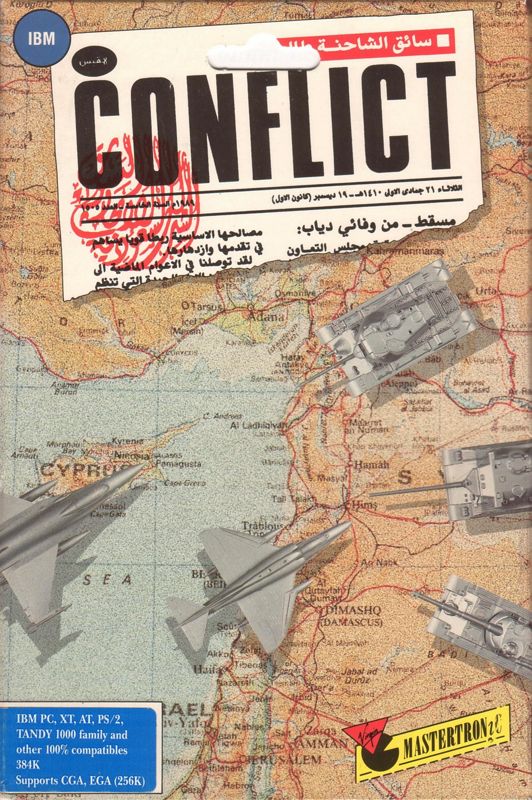
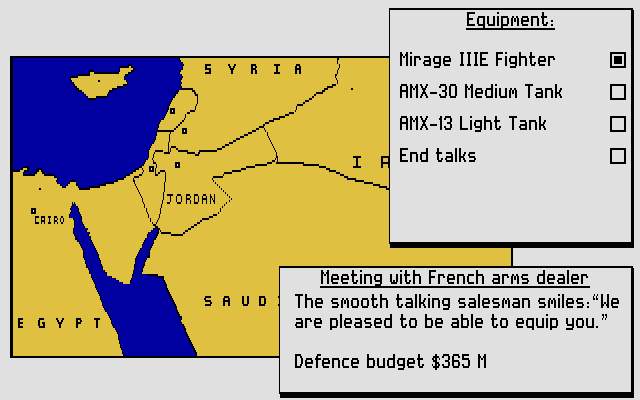
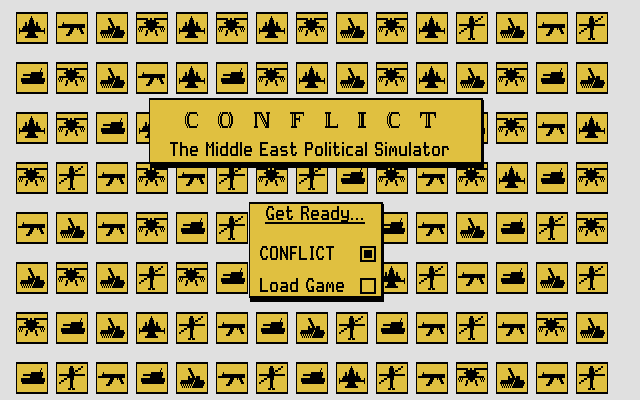
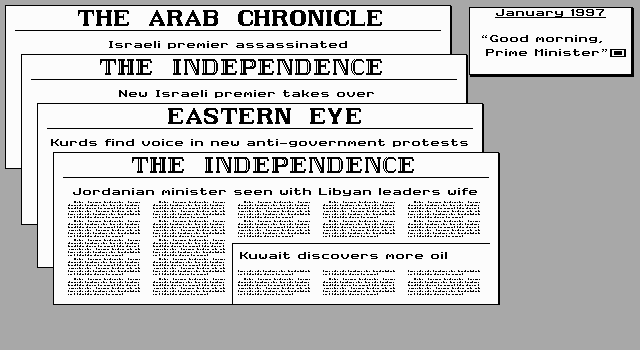
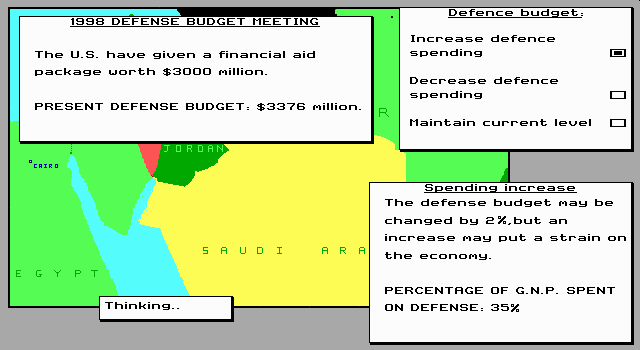
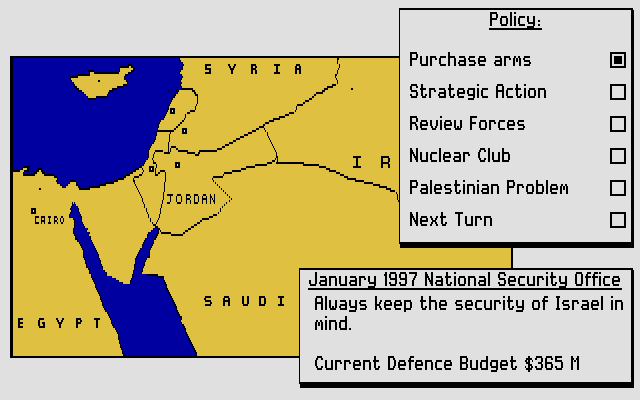


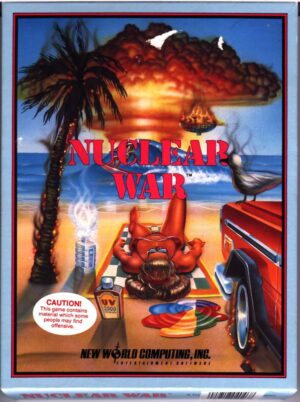
Reviews
There are no reviews yet.